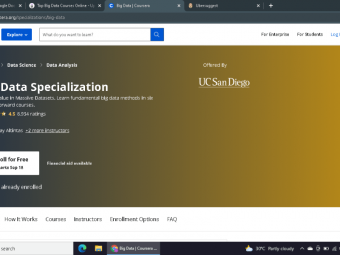Conflict Management In The Workplace
Tags: Conflict Management
How to effectively resolve conflict at work.
Last updated 2022-01-10 | 4.2
- List the main reasons for conflict.- Identify the positive and negative consequences of conflict.
- Express themselves effectively in situations of conflict.
What you'll learn
* Requirements
* Students will need to appreciate that conflict at work can be destructive.* Students need to be open to exploring different ways of resolving conflict at work.
Description
Conflict is a natural feature of human communication. Often we see conflict as negative, and it is true, conflict that is not handled well can have a devastating impact on staff morale and productivity, as well as customer-relations. However when conflict is managed well, it can lead to increased creativity and enthusiasm amongst workers.
This course is of immense practical value to you if you work with other people, whether colleagues or customers. You will learn how to identify conflict, and understand the different types of conflict that occur at work. There is a strong focus on practical skills to resolve conflicts. You will discover what your preferred conflict management style is, and the situations where it is most suitable.
Who this course is for:
- People who work in an environment where they regularly interact with other colleagues or customers.
Course content
5 sections • 26 lectures
Introduction to the course Preview 02:16
Some insights as to what this course will focus on, with regard to conflict management in the workplace.
About your instructor Preview 02:01
This is an opportunity to get to know me, why I am passionate about teaching, and why I believe that conflict management is crucial to a productive workplace.
Objectives of the course Preview 02:21
An understanding of what you will have learnt, and be confident in doing, by the end of the course.
What is conflict? Preview 03:44
An understanding about what makes up conflicts, and who can be in conflict at the workplace.
The cost of conflict Preview 03:23
Exploring the short- and long-term consequences of conflict, which can impact the wider team or organisation.
3 reasons for conflict Preview 06:53
While there are many reasons for conflict, they all fall under the three main ones that we discuss in this lecture.
Hot buttons and more Preview 02:22
Here you are guided to reflect and identify the issues that are most likely to lead to conflict in your individual case.
Multiple viewpoints Preview 03:10
Exploring how the fact that work is made up of different personalities and ways of looking at life and work can contribute to conflict.
2 types of conflict Preview 03:15
Understanding the two types of conflict, cognitive and emotional, and how approaching conflict in one way can be more productive.
Personal need and solution Preview 02:48
Analysing how focusing on personal need or else focusing on a preferred solution can impact conflict.
Group development Preview 03:58
Examining the different stages of group development, and how the type of conflict is often different depending on the life stage of the group or team.
Groupthink Preview 03:47
Delving into one of the most harmful consequences of avoiding conflict.
Conflict as positive Preview 03:34
Exploring that many benefits of conflict that is managed well, and how we can use disagreements as a huge benefit.
Conflict as destructive Preview 02:52
Understanding further the destructive elements of conflict, with the aim being to prevent then happening, and instead use conflict as a positive.
Which effect? Preview 02:13
Looking into the ways in which we can change the course of conflict, to make it into an occurrence that benefits all the people involved, and actually strengthens the team.
Case study Preview 02:26
A case study of conflict at work is presented here, and students are urged to consider the questions at the end. This is an opportunity to apply the points presented so far in the lectures.
Discovering your conflict management style Preview 00:05
Please complete the questionnaire available here, so you can work out your preferred conflict management style.
Understanding your conflict management style Preview 06:30
Understanding the advantages and disadvantages of each conflict management style, and how they are each suitable in particular types of situations. There is also a practical exercise to complete, so you can reflect on ways to resolve conflict more effectively.
Aiming for win-win Preview 07:55
Exploring 3 potential outcomes to conflict, and reflecting on two case studies to understand how to achieve a win-win outcome.
Informal resolution Preview 02:28
Delving into the advantages of an informal resolution to conflict, and how to achieve this.
The conflict resolution process Preview 09:14
Outlining a 6-step process to resolving conflict at work, which is effective in the vast majority of conflict situations. Also a practical tasks to support you embed this learning:
a) Use the checklist to help you manage conflict resolution conversations.
b) Use the reflection document to help you focus on a specific issue at each step of the conflict resolution process.
Communication techniques Preview 05:07
Examining specific communication techniques, and how you can use the to effectively resolve conflict at work.
When conflict persists Preview 03:30
Exploring different ways forward when conflict persists, even after enacting the 6-step process and using the recommending communication techniques.
Mediation Preview 02:33
Understanding what mediation is, and how it can be a valuable option to pursue in complex conflicts or ones that have escalated.
The manager's Ps! Preview 03:30
If you don't take anything else with you from this course, take this: The 7 Ps for managers, and you will be able to effectively resolve conflict at work. There is also a worksheet to help you identify how to develop your Ps.
Conclusion and takeaways from the course Preview 03:20
Outlining the main conclusions and takeaways from the course. I strongly encourage you to complete the worksheet, so you can reflect on your strengths and areas for improvement with regard to conflict management in the workplace.








 This course includes:
This course includes:
![Flutter & Dart - The Complete Guide [2022 Edition]](https://img-c.udemycdn.com/course/100x100/1708340_7108_5.jpg)















